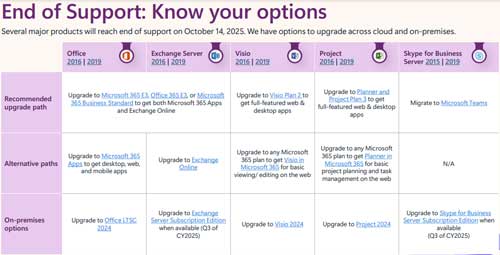News
Microsoft Rings Support Alarm for Some Office, Exchange and Skype Products
- By Gladys Rama
- October 16, 2024
There's only one year left of support for over two dozen 2016- and 2019-branded Office solutions, Microsoft reminded this week.
"One year from today, on October 14, 202S, support will end for all Office 2016 and 2019 suites, standalone apps, and servers," the company said in a Monday blog post.
Specifically, the affected products are:
- Access 2016 and 2019
- Excel 2016 and 2019
- Exchange Server 2016 and 2019
- Office 2016 and 2019
- OneNote 2016
- Outlook 2016 and 2019
- PowerPoint 2016 and 2019
- Project 2016 and 2019
- Publisher 2016 and 2019
- Skype for Business 2016 and 2019
- Skype for Business Server 2015 and 2019
- Visio 2016 and 2019
- Word 2016 and 2019
Unsupported products are no longer eligible to receive security patches, bug fixes, product support or other updates from Microsoft. As a result, they pose significant compliance and security risks. Additionally, these products can create inefficiencies if their lack of bug fixes causes them to become unstable or difficult to use.
Large-scale migrations can be unpredictable and time-consuming, so Microsoft urged IT pros to "[start] your upgrade to supported versions of these products as soon as possible."
The table below shows the upgrade options available for each of the affected products. Microsoft generally recommends organizations move to the cloud-based versions of unsupported products so they can receive continuous updates, though it also provides on-premises options for businesses that require tighter control over their infrastructures or that cannot fully migrate to the cloud.
 [Click on image for larger view.] Recommended upgrade paths for Office products losing support next October. (Source: Microsoft)
[Click on image for larger view.] Recommended upgrade paths for Office products losing support next October. (Source: Microsoft)
The following blog posts provide more detailed upgrade guidance for certain products:
- Office 2016 and 2019: The E3 subscription of Microsoft 365 is the preferred upgrade path for these suites, with Microsoft touting its AI and security capabilities. However, Office LTSC (long-term servicing channel) 2024 is available for devices that can't tolerate frequent updates.
- Exchange Server 2016 and 2019: Microsoft recommends the cloud-based Exchange Online or Microsoft 365 solutions, but Exchange Server SE is an option for organizations that need an on-premises e-mail server.
- Skype for Business Server 2015 and 2019: Here, Microsoft Teams is the recommended cloud-based option, and Skype for Business Server SE the on-premises one.
- Project 2016 and 2019: Microsoft proposes several alternatives for these products, including Planner and Project Plan 3, Microsoft 365, Project Standard 2024 or Project Professional 2024.
- Visio 2016 and 2019: Upgrade options for these products include Visio Plan 2, Microsoft 365, Visio Standard 2024 or Visio Professional 2024.
Microsoft offers its partner-supported FastTrack service for organizations that need assistance with their migrations.